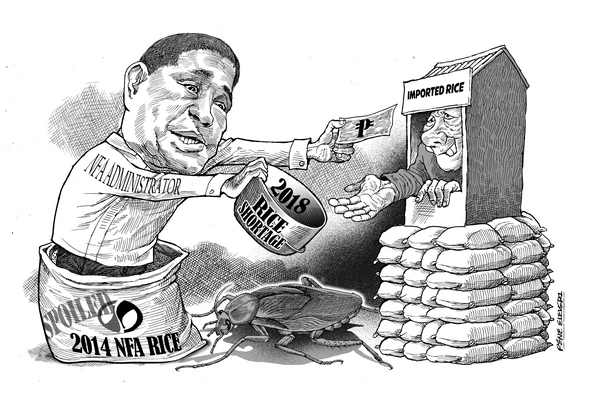
National Food Authority (NFA) Administrator Jason Aquino’s admission that they sold rice to traders during a recent Senate agriculture committee hearing raised serious doubts on the agency’s leadership and the viability of its existence amid the recurrent rice crisis being experienced in the country.
Aquino clarified that the stocks sold to the rice traders came from their 2014 inventory yet which prompted Sen. Cynthia Villar to declare that these stocks were rotten and thus unsafe to eat.
But Aquino hastened to add that the 2014 rice stocks were not rotten, just “aging.”
Kind of like the old NFA rice that had been recently rationed off to Cebu’s rice dealers which drew complaints from consumers who said it didn’t look fit for consumption.
How the NFA amassed this rice surplus and whether they were able to sell it to local governments like Cebu province for their welfare programs is something the NFA through their local officials had failed to sufficiently answer.
The Cebu Provincial Board (PB) were unable to extract answers from local NFA officials on why their office had no sufficient rice stocks which the Capitol could have bought to feed their inmates and the beneficiaries of their outreach programs.
So then since the NFA had a large inventory of rice that they were all too eager to sell to traders, why request the NFA council to authorize the importation of rice in the first place?
In fact, why issue a press release stating that the NFA has less than a month’s worth of rice when it still had rice stocks dating back to four years ago to dispose/sell off?
That the Department of Agriculture pointed out that the country had a sufficient rice supply locally sourced from farmers and thus don’t need to import rice sends a mixed, confusing signal to consumers who consider rice to be their main staple since childhood.
The NFA has at the very least a spotty track record when it comes to ensuring the country’s rice supply since its leadership prefers to import rice rather than buying straight from local farmers on the rationale that it would offset competition posed by middlemen, who usually corner the local rice supply due to their better offer.
When asked why the agency didn’t buy from rice farmers in Mindanao for one, Aquino said the local rice didn’t meet their standards for low moisture content.
In that respect, government should provide the post harvest facilities that the farmers need to dry their rice properly in order to meet NFA standards.
While Congress should probe deeper into the rice cartel reports and its alleged collusion with NFA officials, along with the executive department should look into whether the agency had outlived its usefulness and its functions should be relegated to another agency or into existing ones under the Department of Agriculture.
Disclaimer: The comments uploaded on this site do not necessarily represent or reflect the views of management and owner of Cebudailynews. We reserve the right to exclude comments that we deem to be inconsistent with our editorial standards.




